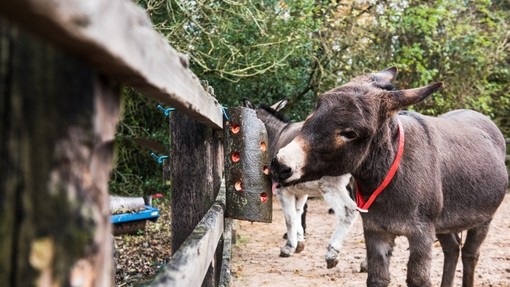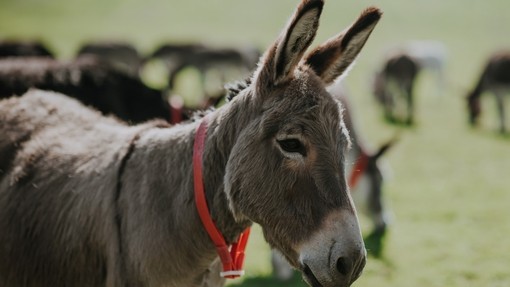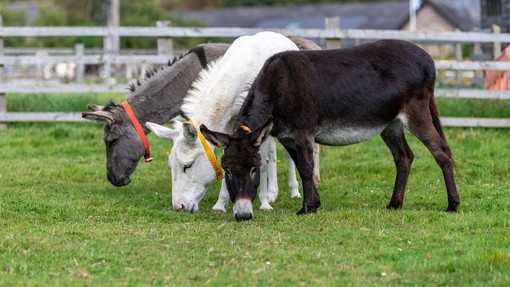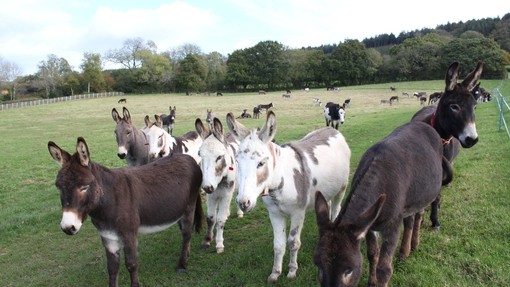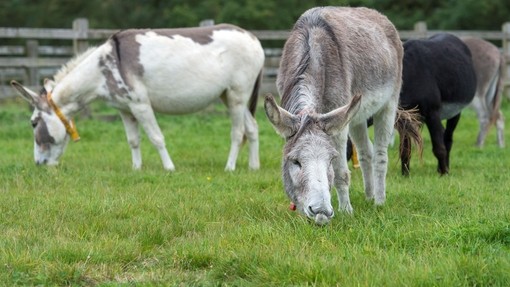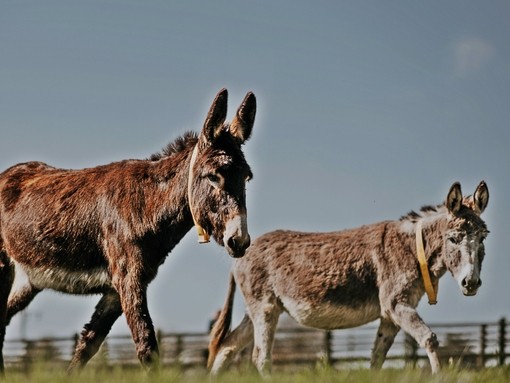
Pair bonding in donkeys
Teddy the blind donkey was a huge favourite with visitors to The Donkey Sanctuary Sidmouth, many of whom adopted him for several years up to his death in 2017. His favourite spot was any patch of sunlight in the yard. His lack of sight never seemed to bother him, partly because he was born blind and enjoyed a stable routine, but largely because he was closely bonded to another donkey, Lucky. Lucky used to lead Teddy around by the head collar, and stood guard over him if any other donkeys tried to bother him.
The idea that donkeys form strong pair-bonds with other donkeys has been common knowledge among donkey owners for centuries, but remained largely anecdotal until recent studies began to identify observable behaviours that proved the theory.
The studies confirmed that donkeys formed strong and long-lasting friendship groups that manifested as high-tolerance and affiliative behaviour, and that separating bonded donkeys often caused extreme distress in the form of pining behaviour, and loss of appetite .
A further study summarises: ‘’Pair-bonds and associations in domestic donkeys are a predominant feature of their social organisation. Where pair-bonds do occur, both individuals within a dyad are capable of individually recognising their companion, and prefer to be close to them.”
The Donkey Sanctuary strives to provide an environment that allows its resident donkeys to express all their natural behaviours, including bonding behaviour. Preserving and promoting friendship groups and pairs is of paramount importance.
The Donkey Sanctuary’s welfare officers are trained to look for signs of bonding between the donkeys they rescue, to ensure that friends are kept together through the already stressful process of recovery and rehabilitation. Hannah Bryer, senior donkey welfare adviser, says: “Bonded donkeys typically graze close together, often touching noses. If you move one, the other will follow. If separated, they become agitated - they might breathe more heavily, pace, paw the ground or bray to locate their friend. As well as these distress signals, donkeys can ultimately respond to the stress of separation by refusing to eat, which can lead to hyperlipaemia, a potentially fatal condition.
“Having identified a bond through a step-by-step process of observed behaviour, we always take the friendship into consideration when making plans for rescue and care.”
Bonding is also carefully considered during medical treatment. Vet Vicky Grove explains: “When we designed our new, state-of-the-art veterinary hospital, we made sure that there was room for a friend to come in with the donkey patient. The nearer the friend is - preferably within sight - the better.”
When one half of a bonded pair is euthanised, The Donkey Sanctuary advocates allowing the companion time with the body, to prevent him from fruitlessly searching for his friend. Vicky Grove has twice seen extreme reactions: “It’s quite rare to witness, but in both cases the companion donkey used their teeth and front legs to pull and push at the ears and body of their friend, trying to wake them up and make them stand. They also made the most awful braying noises - it was heartbreaking.”
Bonded pairs are often sociable within their herd, but close observation reveals they are seldom out of one another’s sight. Adoption donkey Jimmy who is a lively, playful adoption donkey, can be hard to identify from the rest of the herd. Luckily Jimmy’s companion, Skittles, is easily identified by distinctive white markings - and Jimmy is always at his side. At The Donkey Sanctuary Sidmouth, when Timothy and Walter retired from donkey-assisted therapy duties in summer 2017, Walter stood guard over Timothy for several weeks while they settled into their new stables. Over in the young donkeys’ paddocks, Ashley, Mr Khan and Zena, who were raised together, are seldom out of each other’s sight and routinely race around the fields in close proximity; placid Mr Khan is especially protective of boisterous Zena.
Share this page
Tags
- Blog

